Cats are dicks.
Before the cat lovers of the world descend on the Tor.com offices, think about it for a moment. You have this animal in your house, most likely by choice (and if it’s not by choice, you should probably look into getting that taken care of), and sometimes you can pet them if they’re so inclined. If they are not inclined, you’ll most likely get a swipe of claws on the back of your hand or knuckles. They also tear through your house at three o’clock in the morning, crashing into doors and walls. It’s supposedly to “release energy” according to cat scientists, but you absolutely cannot convince me that needs to be the case in the middle of the night.
My cat, Otter, is a dick. She doesn’t like anyone aside from me—even then, she has to be in the right mood—and will prowl and hiss anytime I have someone over at my house, which does wonders for my dating life. I love her, but it can be an exasperated type of love, like the kind I imagine parents have for their kids when they find out their children have drawn on the walls with permanent markers.
When I started writing The House in the Cerulean Sea, I knew the lead character—Linus Baker—would be a fussy, prickly fellow, set in his ways as a mid-level bureaucrat, employed by the Department In Charge of Magical Youth (DICOMY). He has his routine, living a somewhat dreary life in a city where the rain never ends.
Buy the Book
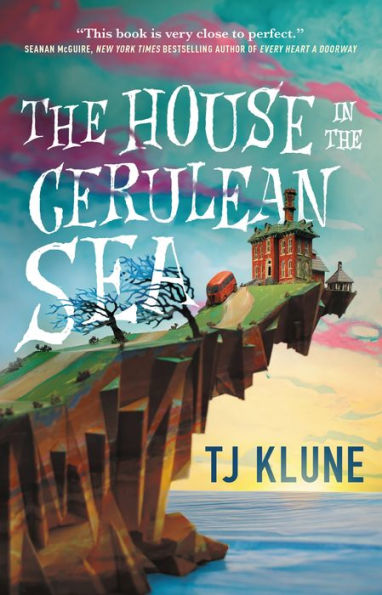

The House in the Cerulean Sea
His only burst of color in an otherwise drab existence is Calliope, his diva of a cat he found as a kitten before the novel opens. Though she cannot speak, Calliope plays a central role in Linus’s development as a character, helping him to step out of the rain and into the warm sunshine, surrounded by a cerulean sea.
Cats have a long and storied history in the science fiction/fantasy genre, be it books or film or television. Whether they speak or not, cats—with their otherworldly countenance—tend to make interesting companions, either acting as a foil for the hero/heroine or having their own ulterior motives. It’s why I chose to have Linus—a man without friends—speak to his cat as if she were a person. While she doesn’t speak, she gets her point across quite easily.
Here are a few fictional cats that stand out for me:
Ser Pounce (A Feast of Crows)
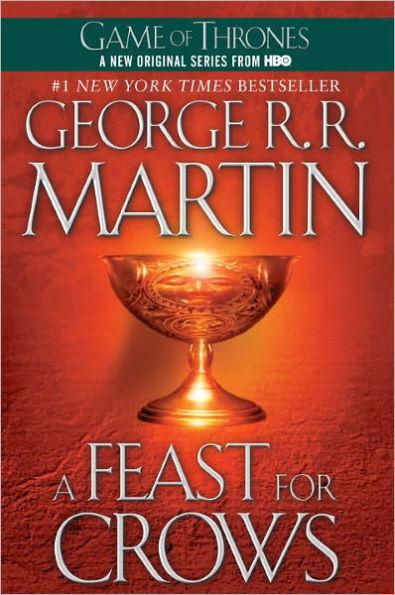
George RR Martin kills everything: people, dragons, dogs, beasties, heroes, villains—no one is safe from his diabolically evil mind. Thankfully, Ser Pounce wasn’t one of his many victims, at least not yet. Given as one of three kittens to Tommen (Boots and Lady Whiskers being the other two), Ser Pounce chases a scrap of fur that Tommen tied to a fishing pole. When a mouse is stolen from Ser Pounce by Lady Whiskers, the terrifying Cersei Lannister says, “Ser Pounce must learn to defend his right. In this world the weak are always the victims of the strong.” (And, if she wasn’t terrible enough already, in the television version of Game of Thrones, Ser Pounce is apparently executed off-screen under Cersei’s orders. Yikes.)
Greebo (Discworld)
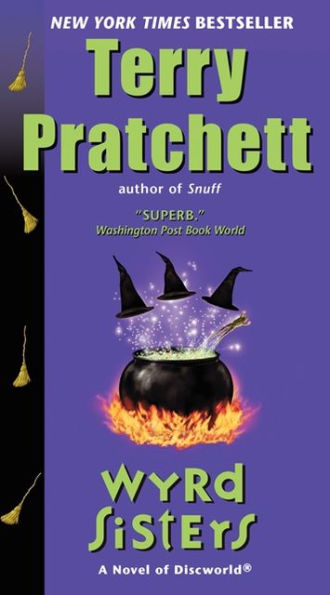
Terry Pratchett can make me laugh like most authors can’t. Greebo, a cat with one green eye and one milky white, is no exception. But for me, the humor comes not from when Greebo is a cat (though he does chase bears and eat vampires), but when he is transformed into a human, while still retaining all his cat-like mannerisms. The fact that women fawn over him only adds to his mystique, especially since, as a cat, he made it his mission to father as many offspring as he possibly could.
Lying Cat (Saga)
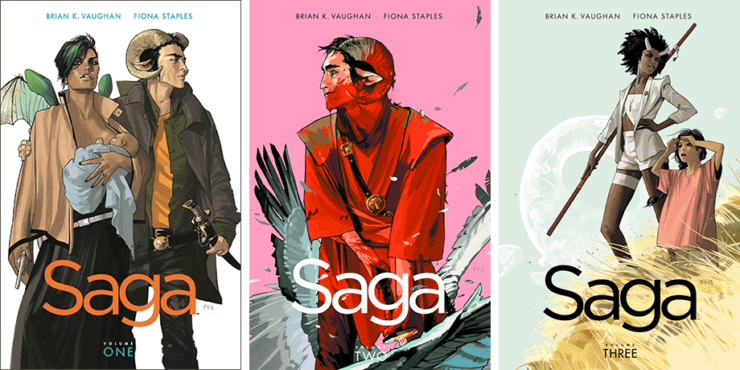
Sidekick to the Will, Lying Cat looks like a sphinx, and is greenish-blueish with yellow eyes. She also has the ability to suss out when someone is telling a direct lie, uttering the word “Lying.” While she can be vicious, she also has kindness in her. In issue #14, Sophie says, “I am all dirty on the inside because I did bad things with—” to which Lying cat replies, “Lying.”
Bagheera (The Jungle Book)

Whether it be from the novel by Rudyard Kipling or the sanitized Disney version of the same name, Bagheera—a black panther—is a wonderfully gruff empathetic character. Acting as a protector and friend of Mowgli, Bagheera heartbreakingly reveals why he has the insight into men that he does: he was born into captivity and suffered because of it. While it could have led to him becoming a villain, he instead chose to protect those who couldn’t protect themselves, namely Mowgli. He becomes Mowgli’s mentor through their adventures, and in the end, has the best line (in my opinion): “Remember, Bagheera loved thee.”
Church (Pet Sematary)
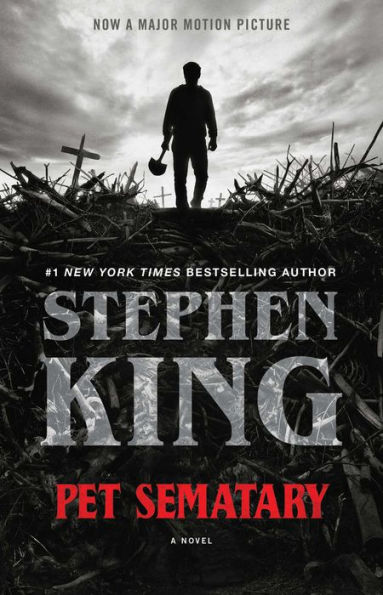
Church doesn’t speak, doesn’t act as a mentor, doesn’t tell when people are lying. For all intents and purposes, he’s just a cat. But since this is Stephen King we’re dealing with, it’s never that simple. Church dies, a victim of the busy road in front of the Creed home. Unable to tell his daughter that Church has died, Louis Creed follows Jud Crandall into the woods, and buries Church in the “pet sematary”. Church comes back, but he’s not the same. And while he still doesn’t speak, he acts as a chilling lesson in what happens when men try to play god for the love of their family. Things do not end well for Church, or for the Creed family.
Now, if you’ll excuse me. My cat is sitting on my desk as I write this, staring at me in that way she does, statute-still until I give her the attention she so demands. She’s a dick, sure, but I belong to her because she chose me. And I wouldn’t have it any other way.
Originally published March 2020.
TJ KLUNE is a Lambda Literary Award-winning author (Into This River I Drown) and an ex-claims examiner for an insurance company. His novels include The House on the Cerulean Sea and The Extraordinaries. Being queer himself, TJ believes it’s important—now more than ever—to have accurate, positive, queer representation in stories.










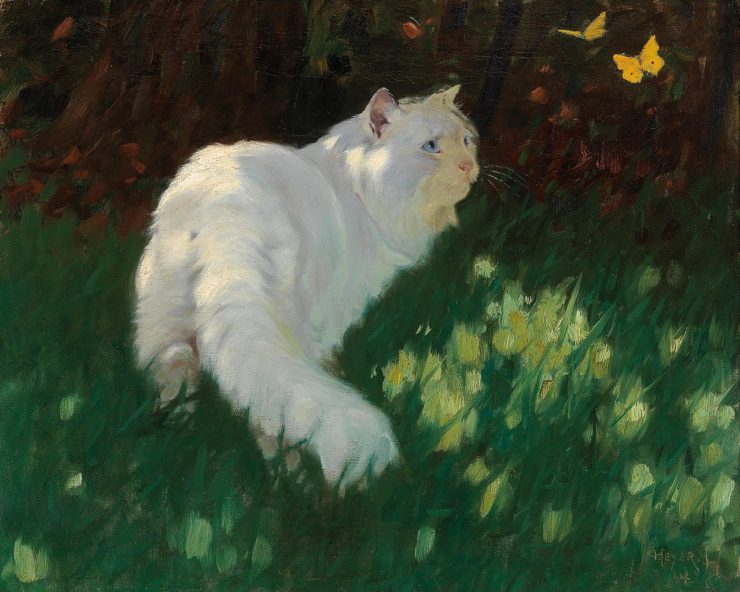
On behalf of Lirael I am outraged that Mogget, aka Yrael is not on this list.
Then there is Sauron’s cat, Shelob.
Oh, but what about Faithful from the Song of the Lioness Quartet by Tamora Pierce?
I like this list! To it I would add Graymalk from Zelazny’s wonderful A Night in the Lonesome October.
No inclusion of Jonesy from Alien? A travesty!
Brush up your Heinlein, folks!
Pete the Cat from “The Door Into Tomorrow”
Pixel the Cat (Who Walks Through Walls)
And of course: Flat Cats!
Zap the Cat seems to have a good time running Vorkosigan House.
The talking cat in Space Opera by Cat Valente.
Austin from Tanya Huff’s Keeper Chronicles. I mean you have to have someone to keep tiny multicolored demons under control!
I always tell people that my cat is defective. Instead of aloof and dickish, my cat is super clingy. Ever since I got him at 1 year old (he’s 11 now), he likes to spend his time laying on me (when he’s not eating). As I type, he’s sleeping in his bed next to my chair, as he has to be around me at all times.
Don’t leave Mister from Harry Dresden off of the list!
We need Mogget (from the Old Kingdom saga) on the second part of this list!
@@@@@ No. 3, Agreed. I call shenanigans that Faithful/Pounce isn’t on this list.
What about the Cheshire Cat from Lewis Carroll’s Alice’s Adventures in Wonderland?
No mention of Lord Merlin from the Liaden novels?
Yeah where is the Cheshire Cat???:)

OP: “he instead chose to protect those who couldn’t protect themselves, namely Mowgli”
Bagheera is a Windrunner!!!
Jokes aside, I have loved Bagheera since I first read the book.
4: In another Zelazny book, Doorways in the Sand, there is the cat who is a Whillowhim Agent.
The Cheshire Cat (AKA. Cat Formerly Known as Cheshire, or Unitary Authority of Warrington Cat, or, to his mother, Archibald) also had a great run as the librarian in the Great Library of the Thursday Next books. His absence is disappointing.
And Jonesy from Aliens would have been included had they given him more to do. A great actor was robbed of his chance to stretch his chops. Nope, it was all about Newt and Ridley.
I came here just to make sure Lying Cat was on the list.
Jeoffry and the other demon-fighting cats in “For he can creep” on this very site.
I was halfway through this fine article when my cats, 3-year-old Manx brothers named Stan and Ollie, came crashing up the stairs and under a bed. I had bought some produce at the farmers market and, like a fool, had left the bags on the counter, fortunately after removing the fruit and veg. (The cats are not allowed on the counter.) Ollie had jumped up to investigate and got stuck in one of the bags. He fled upstairs to escape his attacker, with Stan trying to help him. No luck. Fortunately they are sweet cats who don’t bite or scratch, and I was able to rescue poor Ollie and then read the article.
I wonder if the ghatti count from Gayle Greeno’s books. They’re wonderful and some are absolutely jerkfaces.
@2 what, no love for Tevildo?
SKitty from the linked short stories by Mercedes Lackey. The Firecats from her Valdemar series too.
The lovely TT from Schmidt’s short story “Novice”, a crest cat native to the planet Jontarou who is working very hard to try and get her human, Telzey, to learn telepathy dangit.
The Named from Clare Bell’s series of YA novels, a pride of intelligent cats who learn to manage and control fire, herd and tend their prey animals, domesticate the small lemurish treelings, and are well on their way to changing the course of prehistory.
Llyan from The Chronicles of Prydain, a mountain cat turned giant by a magician’s wayward spell, who ends up an unconventional bard’s unconventional mount.
Uncle Rogi from Julian May’s ‘Galactic Milieu’ series owned Maine Coons that were always called Marcel.
@23
Absolutely!
As we say in the Facebook groups (or at least as I say) “Tevildo rules, Huan drools!”
And don’t forget the proverbial cats of Queen Beruthiel, rumored to be the last children of Tevildo to trouble this unhappy world!
Although (as my good friend Rowdy the terrier will attest) I’m more of a dog person, I’ve read and greatly enjoyed all five of the original examples and several of the additions, to which I’ll add a pair of talking cats: Raul, from Howard Chaykin’s American Flagg! and Rowl, from Him Butcher’s The Aeronaut’s Windless.
ISTR that a recent Tor thread brought up Ruthven Todd’s “Space Cat” books. Not even YA — more like middle-grade or elementary — but I remember them fondly. Somebody thinks the suck fairy hasn’t been at them, as they’ve just been reprinted.
Diane Duane’s Wizard cats who have there own books in her Young Wizards series.
Not to mention the cats who are the stars of Jim Butcher’s The Aeronaught’s Windlass.
Mister from The Dresden Files??? Cat Sith?!?
Tangential: my beloved cat Linus passed away suddenly in October of last year. About a week later my library hold of The House in the Cerulean Sea came in and I was so eager to read something that might soothe my aching heart. However, as soon as I saw the lead character’s name, I had to send it back. I hope someday soon I will be able to get past that and enjoy the book.
Does the Cattail from A World Out of Time count? I remember it more distinctly than the human characters.
Isis is fetching in her sparkly necklace and might be slightly more competent than Gary Seven. Likewise, Crookshanks struts that awesome, fluffy, stripy tail while spending the better part of a book trying desperately to point the Trio at the correct target.
Along with Bagheera, we might want to count Silas- the Bagheera analogue from Neil Gaiman’s The Graveyard Book.
I second Mister from Dresden Files.
I would also like to nominate Stench Machine from Futuristic Violence and Fancy Suits
This is Mogget erasure and I won’t stand for it!
5; agree – Jonesy was, arguably, the smartest member of the crew.
28; Flyball from the Spacecat series – concur. Damn useful for a cat.
If “alien” cats are allowable, then the scores of named treecats from the Honor Harrington series presumably should be here somewhere.
Well, there’s Throgmorten from The Lives of Cristopher Chant, of course.
And if we’re allowing cat-shaped entities such as Mogget, then Goose from the recent Captain Marvel film must rate a mention too!
Does anybody else recall the great Miaowara Tomokato from Mark E. Rogers’ series of illustrated books The Adventures of Samurai Cat, etc.? Such brilliantly funny stuff!
Apart from Mister in Dresden Files, I would like to put up Rowl from Butchers newest series, Cinder Spires, here.
Now *that* is a cat not to mess with…
Might be hard to find, but there is the Anthology and 2 issue magazine Cat Tales: Fantastic Feline Fiction edited by George Scithers.
Contains a reprint of Kreativity for Kats by Fritz Leiber, one of a short series about Gummitch which appeared in various magazines over the years.
Possibly stretching the definition of “cat” well past its breaking point, but Aineko from Charles Stross’ Accelerando.
@@.-@. JohnFromGR
@20. platypus rising
I was hoping someone would mention Graymalk. Night in the Lonesome October is one of my all time favs. I always wanted more stories with Snuff and Graymalk.
And for those who haven’t read Siobhan Carroll’s For He Can Creep you’re missing out on a great tale. Jeoffry is wonderful but I want the tale of the nighthunter moppet (their name alone is fabulous). The story is on this site.
And I’ll add my name to the list of those who mentioned the Cheshire Cat. Probably my first introduction to obnoxious cats

T. S. Eliot’s ‘Practical Cats’ (NOT the musical!!!) Especially McCavity!
What? No mention of Spot, Data’s cat in Star Trek: TNG?
Subject an epic poem within the show (Ode to Spot), and protagonist of three short stories: “Spot’s Day,” by Diane Duane, “On the Spot” by David A. McIntee, and “My Human is Not,” written by Jackson Lanzing & Collin Kelly with art by Sonny Liew (search for it online – it’s a good ‘un!).
Also, a couple standouts from some more recent space opera:
• Mephistopheles and Bushyasta in Ancestral Night by Elizabeth Bear
• Mr. Feefs in Suzanne Palmer’s Finder series
I’m coming from a family that has always had dogs and I can’t really warm up to cats. They can be lovely at best, but as it says in the essay you can never be really not to get your hand scratched by some nasty claws out of nowhere…
That said, all you cat lovers out there might want to check out the five Catfantastic anthologies (Catfantastic, Catfantastic II, Catfantastic III, etc.) that Andre Norton edited together with Martin H. Greenberg, as well as the two Magicats anthologies edited by Jack Dann and Gardner Dozois.
Actually, I don’t mind cat stories at all if I think about it. I can be sure to come out on the other side with my hands unscratched with those cats!
Spacetime for Springers!
Rowl from The Aeronaut’s Windlass is definitely deserving of a place on this list. He’s such a great character. Can’t wait for the sequel.
All the space-walking magical cats of the Liaden universe belong on this list.
@14: I was coming just to be sure Merlin was mentioned . . . awesomeness dressed in fur!
@47: And you filled in the rest! (Of course the authors currently have at least 3(?) Maine coons keeping them company.)
Tybalt, Raj and many others from McGuire’s October Daye books. Cat royalty for the win!
Can we add the Flerken from Captain Marvel?
Glad to see Mister and Llyan and many others (Zap!) in the comments.
The Game of Rat and Dragon.
Pinlighters.
C’mell.
The ghost cat in Peter Beagle’s Tamsin, that carefully collected itself before jumping through a solid wall. As one would…
Maruman – the Moonwatcher – from The Obernewtyn Chronicles
Heinlein was a cat guy, for all his faults, he got that right. Pirate from The Puppet Masters, Mr. Underfoot from The Door into Summer.
The cat in The Door into Summer was Petronius the Arbiter. Someone I’d never heard of, when I first read the book.
His formal name was shortened to Pete.
Fernhunter: Which Heinlein cat was Mr. Underfoot? I always loved that name because it was sort of cat and hobbit in flavor.
@@@@@ 56, Kirstein McCann:
Fernhunter: Which Heinlein cat was Mr. Underfoot? I always loved that name because it was sort of cat and hobbit in flavor.
Friday
Sehtek, Smerdis, Castlemew and (especially) Amon from The Cats of Seroster by Robert Westall.
What about Murakami’s talking cats?